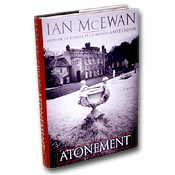
If you knew for a fact that you’d ruined someone’s life – two lives, really – how would you make amends? That’s the question the stark title of Ian McEwan’s beautiful and wrenching new novel refers to. Atonement is about a crime and its consequences over the course of six decades: In the mid-thirties, a precocious young girl with an overactive imagination helps to wrongly accuse an innocent man, and it is not until 1999 that she finds a kind of absolution. But this book, McEwan’s grandest and most ambitious yet, is much more than the story of a single act of atonement.
In his compact and clockwork-precise earlier fictions, McEwan (whose previous novel Amsterdam won the Booker in 1998) liked to show how relationships and people can disintegrate in ways that manage to seem both shocking and inevitable. (The Comfort of Strangers, which became a film starring Natasha Richardson and Rupert Everett, starts out with a holiday in Venice and ends with a murder.) The new book, too, begins innocuously enough, with a deceptive, Merchant-Ivory languidness. On the hottest day of 1935, the wealthy Tallis family – Emily, the migraine-prone matriarch, and her three children, Leon and Cecilia, both in their twenties, and 13-year-old Briony, the would-be writer – are preparing for houseguests. Among these are the children’s cousins, the Quincey kids, whose parents are divorcing; a chocolate-magnate friend of Leon’s named Paul Marshall, who goes on to become a war profiteer; and the Tallis children’s oldest friend, Robbie Turner, the son of the family charwoman – a brilliant young man whose education the absent Tallis patriarch, Jack, has paid for. (Class is inevitably a big preoccupation here.) Briony has written a play, The Trials of Arabella, in honor of the occasion.
It never gets performed. Like small atmospheric disturbances, private tensions and agendas – the pubescent Briony’s jealousy of Cecilia, the attention-starved 15-year-old Lola Quincey’s burgeoning sexuality, Emily’s subtle but deep-seated snobbery – come together to create the perfect narrative and moral storm. When, at the climax of the evening, a young girl is assaulted (or is she?), it’s almost inevitable that the wrong man goes to jail – largely because of Briony’s testimony, which has more to do with what she wants to be true than with what she knows to be true. The ongoing conflict between “the passing silliness” of our inner fantasies and “the hard mass of the actual” is a major theme in this novel, which is as much about the nature of fiction as it is about the nature of guilt. (Briony is meant to represent literature; no accident, then, that her victim is someone who has given up studying literature for a career in medicine – someone who naïvely believes in facts.)
In what follows, McEwan shows how accidents of history can elevate private shame and error to the world-historical plane. In the second part, the man Briony condemns ends up as a soldier who takes part in the British Army’s botched retreat at Dunkirk in 1940 (his undeserved fate largely determined by the fact that he’s not an officer, thanks to his prison record); in the third, a guilt-ridden Briony becomes a nurse in a London hospital during the Blitz.
But McEwan is too good a novelist, and too subtle a moralist, to let Briony off that easily; if anything, the information that Briony has been “delivered from introspection” by the grueling hospital routine suggests that her real atonement won’t take the form of anything as mundane, or as easy, as hard physical labor in the service of the less fortunate.
It isn’t, in fact, until you get to the surprising coda of this ravishingly written book that you begin to see the beauty of McEwan’s design – and the meaning of his title. In 1999, Briony, a well-known author, returns to her childhood home for a family reunion. The climax of this occasion is the premiere, after so many years, of The Trials of Arabella – whose plot, you now realize, influenced the confused girl’s long-ago betrayal. But if fiction can destroy, it can also redeem. This is made clear by another piece of “creative” writing that you discover at the end of this book, one that combines truth and fiction in a way that is both shocking and satisfying; I can’t reveal what this is, but trust me, Atonement’s postmodern surprise ending is the perfect close to a book that explores, with beauty and rigor, the power of art and the limits of forgiveness. Briony Tallis may need to atone, but Ian McEwan has nothing to apologize for.
Atonement
By Ian McEwan.
Doubleday/Nan A. Talese; 368 pages; $26.